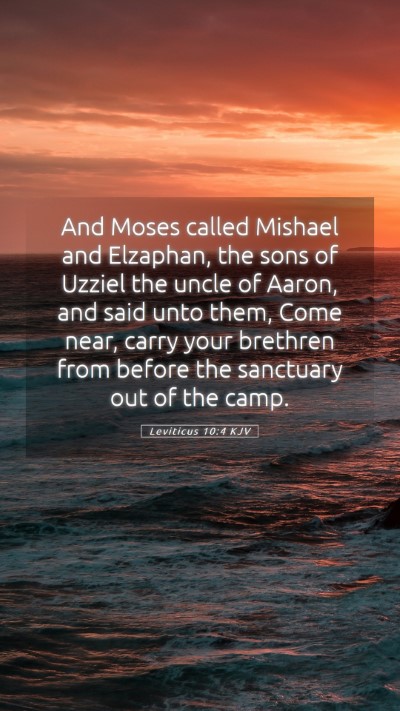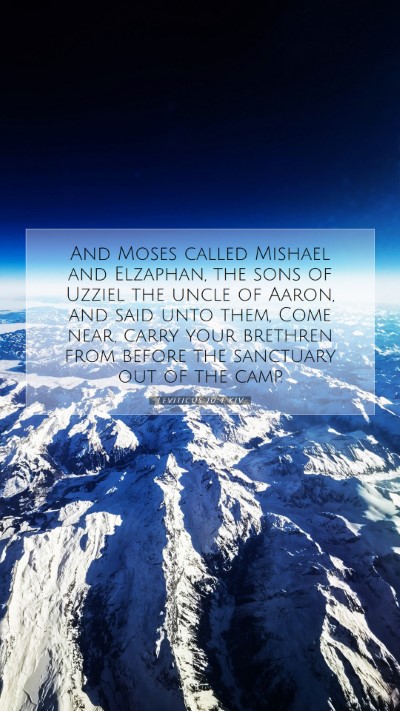Understanding Leviticus 10:4
This page aims to provide a thorough understanding of Leviticus 10:4, an important verse in the context of the Levitical priesthood and the holiness of God's service. We will explore the meanings, interpretations, and explanations of this verse derived from esteemed public domain commentaries including those by Matthew Henry, Albert Barnes, and Adam Clarke.
Verse Text
Leviticus 10:4 (KJV): "And Moses called Mishael and Elzaphan, the sons of Uzziel the uncle of Aaron, and said unto them, Come near, carry your brethren from before the sanctuary out of the camp."
Contextual Background
This verse occurs in the context of a tragic incident involving Nadab and Abihu, the sons of Aaron, who offered strange fire before the Lord, which He had not commanded. As a result, they were consumed by divine fire as punishment. This emphasizes God's holiness and the seriousness of serving Him according to His established commands.
Importance of Priestly Conduct
The actions of Aaron's sons serve as a reminder of the standards expected of those in positions of religious authority. There are deep implications not only for the priests of ancient Israel but for all believers in their service to God today.
Commentary Insights
Matthew Henry's Commentary
Matthew Henry emphasizes the swift action taken by Moses in the aftermath of this incident. He notes that calling Mishael and Elzaphan reflects both a familial and a functional duty, highlighting the importance of immediate and respectful handling of God's judgment. Henry also points out the mercy shown, as these sons were called to carry away their deceased brethren in a manner befitting their sacred role. This indicates that, even in judgment, there is a call towards reverence and solemnity in duties.
Albert Barnes' Notes
Albert Barnes provides an analysis of the names mentioned in this verse, noting their significance in the Levitical lineage. He highlights that Mishael and Elzaphan were tasked with a crucial role in this moment of tragedy, underlining the continuity of priestly responsibility and the sacredness of their roles. Barnes reflects on the theme of holiness permeating all aspects of worship and service within the temple, reinforcing the necessity for purity and adherence to God’s specific commands.
Adam Clarke's Commentary
Adam Clarke notes the emotional weight of Moses's command and the implications of mourning highlights the gravity of the situation. He explains that carrying out the dead was not only a physical act but a profound spiritual statement regarding the consequences of straying from God's ordained path. Clarke also accentuates the distinction between God’s judgment and His grace, where even in moments of severity, there remains a call to respectful service and honor for those who have fallen.
Key Themes
- Holiness of God: This passage underscores the reverence due to God in all aspects of worship.
- Priestly Responsibility: The roles within the Levitical priesthood are taken seriously, reflecting the expectation of godly conduct.
- Consequences of Disobedience: The actions of Nadab and Abihu serve as a stark warning for all believers of the importance of adhering to God’s commands.
- God's Mercy and Judgment: There is a nuanced depiction of both divine judgment and the mercy that allows for continued service among the living.
Application for Today
The significance of Leviticus 10:4 can be applied to modern Christian life in various ways. Believers are to approach God with reverence and are reminded of the importance of purity in their worship and service. This incident challenges us to consider how we fulfill our roles within our faith communities and the expectations God has for us in our personal lives.
Bible Cross References
- Leviticus 10:1-2 - The incident of Nadab and Abihu.
- Exodus 28:1 - The establishment of the priesthood.
- Hebrews 12:28-29 - The aspect of God's consuming fire in worship.
- 1 Peter 2:9 - Believers as a royal priesthood.
- Proverbs 15:29 - The Lord is far from the wicked, but hears the prayer of the righteous.
Conclusion
Leviticus 10:4 serves as a crucial reminder of the seriousness with which God regards worship and the holiness expected from His servants. Understanding this verse within its historical and theological context provides valuable insights into God's nature and the responsibility of those who serve Him. By studying this verse and its surrounding context, believers can expand their Bible study insights and deepen their Bible verse understanding for a more profound daily application of Scripture.


